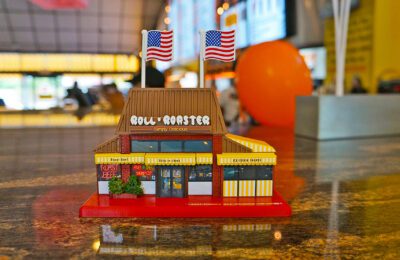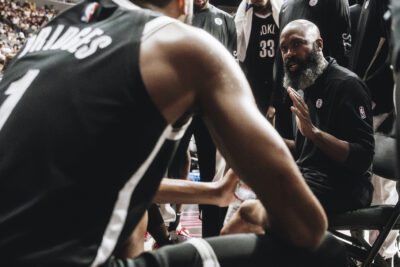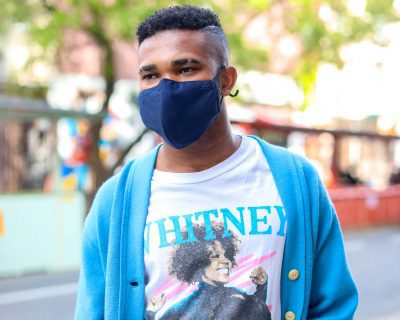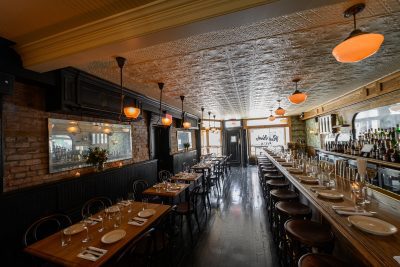John Schaefer and the first 40 years of ‘New Sounds’
The veteran public radio host joins us for a wide-ranging conversation about his career, his musical palate and his most difficult interview
Like what you’re hearing? Subscribe to us at iTunes, check us out on Spotify and hear us on Google, Amazon, Stitcher and TuneIn. This is our RSS feed. Tell a friend!
John Schaefer is as New York as the Brooklyn Bridge, CBGB, MSG and the pizza rat. The public radio veteran has hosted and produced the on-air series “New Sounds” since 1982, For 40 years now he has been the voice (and ears) behind the WNYC cornerstone with an insatiable curiosity and omnivorous palate. Tune in between 11 p.m. and midnight on any given weekday and you’re just as likely to hear a deep dive into the didjeridoo as you are a North African dance party, sounds from south of the Rio Grande or bops from the Balkans. I could go on but we don’t have 40 years.
Schaefer joins me on “Brooklyn Magazine: The Podcast” on the week he’s celebrating his big anniversary behind the mic at WNYC. On Wednesday, September 21, Brooklyn Bowl will host a celebration of Schaefer’s first 40 years at “New Sounds” with a concert and fundraiser featuring performances by Brooklyn-based bhangra fusion group Red Baraat and tropical futurism band Combo Chimbita, along with a DJ set by members of Yo La Tengo. Get your tickets here.
Schaefer, who has also hosted Soundcheck for 20 years this year, joins us to talk about his radio career and his genre-blind approach. Give it a listen here or wherever you get your podcasts. What follows is an edited transcript of our conversation:
Many years ago you were in a bodega and you were talking — this was before I knew what you looked like — and I recognized your voice and I was kind of bowled over. I think I introduced myself then, and maybe once several years later. Does that happen a lot? Do people hear your voice before they recognize you?
It does happen a lot and it never ceases to amaze me. A couple of times this has happened where I’ve been on the subway. We have a softball team, so I’m coming back from a softball game with a couple of members of the team. At one time somebody asked me something and I said, “What?” And the person sitting in front of us looks up and says, “Are you John Schaefer?”
I’d said, “What?” I said a single word. And it was just like, how does that happen? I mean, people must have really, really acute hearing.
Or you’re just on for years and have just seeped into our subconscious. Was this a WNYC softball team?
Yeah, we’ve had a softball team since ’84.
What’s your position?
I’ve been playing a lot of third base in recent years, but I’m a natural first baseman and I think it’s time for me to move back to first base. We’ve had the team since ’84. I am an original of the team.
Are there NYC softball jerseys that people wear?
There are. In fact, from my 30th anniversary, somebody printed up a bunch of the softball jerseys with my name, “Schaefer,” on the back and the number “30.” There’s a great picture of the whole Green Space squad with their backs to the camera, and they’re all wearing these shirts that say, “Schaefer 30.” That was 10 years ago.
We’re talking on the occasion of your 40th for “New Sounds.” Congratulations. Just going through the vast repertoire of “New Sounds” and “Soundcheck,” which you’ve been doing for 20 years now, you’re talking to tabla masters, West African string musicians, new music from Ireland, Afghanistan, Morocco. Music for the flute, music for typewriters. Drone folk, bardcore. Bob Weir. Brian Eno. Nusrat Fateh Ali Khan. And of course, Laurie Anderson, multiple times and recently. Your liner notes have appeared on more than a hundred recordings, music of Cambodia, recordings by Yo-Yo Ma.
So my question is, how does one speak with any authority on such a disparate array of music? How are you not spread so thin? Are you a jack of all trades, master of none? Or do you take a week and go really deep and then forget everything about West African strings? How does that work?
The flip answer would be I’m just faking it. But really, what happens is, for me, it’s all been kind of a natural process of listening. Everything that I’ve heard, that I’ve liked, has led me to something else. And so I started as a fan of David Bowie and Brian Eno and side two of “Low,” the first of his Berlin Trilogy, hit me like a thunderbolt. I was like, “What is this?” And that led me to searching out more of Eno’s music, some of the minimalism of Glass and Reich. And once your ear is sort of detuned from the culture that you grew up in and becomes open to other cultures, it’s kind of like food. You may have grown up with Italian food, but you have that great first Indian meal and then suddenly you’re like, “What else is out there? Let me try this Indonesian dish,” or this Turkish food, or whatever.
Well, not everyone is curious. People like to stay in their comfort zones, especially when it comes to music. What do you think accounts for that? You mentioned the culture you grew up in. What was the culture you grew up in?
I grew up here in New York. I’m from a long time Brooklyn family, although I actually was born and raised in Queens, just where my Brooklyn-born parents had moved before I was born. But I’ve lived my whole adult life in Brooklyn. So back to the ancestral sod. It was not a very musical household. On the other hand, I was extremely fortunate to go to high school in Manhattan in the mid-70s.
Wow. Yeah. Everything was happening.
I was at CBGB’s and saw the first flowering of punk rock. And that idea that there was music out there, that wasn’t what I heard on the radio, that I didn’t even have a word for. The first time I saw a band, it was a Brooklyn-based band called The Shirts. And I went with a couple of friends and afterwards I was like, “Wow, what kind of music is that?” And someone said, “They call it punk rock.” I laughed. I was like, “No, they don’t.”
And in college, you were at the college radio station?
These days, my college, my old college station, WFUV, is a very professionally run station. But in my day, I mean, you want to talk about the inmates running the asylum. It was all us kids. So by the time I got out of there, I had done everything. I had written and hosted a half-hour evening newscast. I had done classical music. I’d done morning drive time pop. I’d done overnight rock radio. And just everything in between.
What was your favorite part of making radio? Was it being on air? Was it writing something? Was it interviewing?
It was being on the air. And even more specifically, it was sort of curating the experience of people who were listening. So it was all over the map musically, even back then. And I just thought, late at night, there’s something magical about listening to the radio late at night. And that’s why all these new technologies have come over the past century or so. And each one of them has been heralded as the death of radio. And radio has survived them all and continues to be important to people, because it’s that kind of one-on-one connection, especially late at night. You just get this feeling that this voice is talking just to you, or you should, if it’s done right. This person is talking to you and is like your friend saying, “Now you got to listen to this,” which is an experience that most of us don’t have anymore.
And is increasingly rare on radio, at least in the free form kind of way. But to your point, just [here are] some radio stats that I looked up this morning: 55 percent of Gen Z in the U.S. listens to AM/FM radio every day. Adults listen to 104 minutes of radio per day. You talk about new technology, the smart speaker has been good for radio and radio discovery.
Absolutely. Public radio is able to at times give you that sense of freeform radio as it used to be in the ‘70s and ‘80s. The idea that the person you are listening to is also the person making the decisions about what you’re listening to. This person is a gatekeeper, an editor, a guide, whatever.
It’s not coming from corporate, iHeart Radio headquarters, whatever.
Exactly. And you’re absolutely right that the advent of smart speakers has sort of had this unlooked-for benefit to terrestrial radio, which is it brings terrestrial radio to people who maybe never thought of buying a radio, but now suddenly they can get their local public radio station and they can get radio stations from anywhere. Anywhere. When we started streaming on the Internet, we would get letters, emails, from all around the world. I got an email from a listener in Tehran, some years ago, and made the mistake of writing back to him, because I thought it was really cool that somebody in Iran was listening. Then it was just like a stream of emails. It was more than I could keep up with.
Going back, you’re in high school, you’re going to CBGB. You’re in college running FUV. Then you go to Portland, is that right? To do classical music?
I thought classical music would be something I could sort of grow with. And I took a job at a commercial classical station in Portland, Maine. And I have nothing bad to say about Portland, Maine. It’s a lovely town. But those six months, the only six months of my life where I lived outside of New York City, that’s when I realized, oh, there’s a rhythm to life in New York. And when you’re removed from it, I just felt jittery all the time. And also the station that I worked for ended up being run by an absolute maniac. I mean, everybody who’s done small town radio has horror stories. So I got out of there pretty fast.
What was it about classical music? Because you are omnivorous in your curiosity and you were just coming out of a punk scene. Why classical?
Because I thought it was the kind of music that I could always find something new to discover. I was aware of Glass and Reich and Terry Riley and John Adams, and I knew that there was new music being written in the classical world that spoke to me, as a refugee from the rock world, so to speak. And I just thought, “Well, if that’s happening, who knows what’s going to come next?” This is a world of music that I can probably start mining today and still be mining a long time down the road.
That’s interesting, it’s modern classical, which is sort of an oxymoron. You’re not talking about baroque fugues and things like that? Or both?
I would say both. I’ve played guitar most of my life, and by around this time, I was beginning to realize that even the songs that I thought were really interesting, were still basically the same three or four chords. And so I started getting into classical music as a way of renewing my interest in the guitar That was a kind of parallel track, was that discovering pre-baroque, pre-Bach music, like “The Suites” by Robert de Visée, for example. Terrific early baroque French composer. Written for lute, but they lie well on the guitar and I love that.
You’re still playing guitar? Do you play classical or do you play a little bit of everything? I play guitar, but I’ve had one for 30 plus years and it’s frustrating, the more you learn, the less you know.
Once kids came along, it was like something I had to give. And I pick up the instrument and I can pluck out a few Reverend Gary Davis tunes.
He had that broken wrist, which made his finger work on the neck, all the better.
And he was just that kind of Piedmont blues and the fact that he lived in New York. And it was a steady parade of Northeastern white guys going to his door in Harlem, to learn the blues from a man who helped create that genre of blues. That’s just a great New York story.
Did you ever make that pilgrimage?
No, but I did pick up one or two songs from Jorma Kaukonen, obviously formerly of Jefferson Airplane, who was a huge acolyte of Reverend Gary Davis.
Is there any kind of music that you just can’t get into? Anything that you’re embarrassed to say, “I just don’t like it?”
Philip Glass asked me that question, many years ago, “Is there any kind of music you don’t like?” And I immediately said, “Country.” And as soon as the word was out of my mouth, I was like, “You are an idiot,” because you like Tennessee Ernie Ford. You like Chet Atkins. You like Lefty Frizzell. You like Hank Williams. What are you saying? And I just find it ridiculous to come out with a blanket statement like, “I hate fill-in-the-blank,” because that says more about how little of that music you’ve listened to, than it does about the music itself.
I’m always amazed when people say, “I don’t like country.” I’m like, “Well, you probably don’t like pop country.”
Exactly. That’s exactly right. Yes. And in the old “Soundcheck” days, when we had a steady stream of guests, it was like a running joke among the staff that they would occasionally book Broadway singers, “Schaefer hates Broadway.” And I can’t get into that style. On the other hand, I love Sondheim and I love the Great American Songbook, much of which comes from Broadway jazz standards.
How do you discover new music? Where do you go to proactively hear something new?
I get 200 to 300 emails per day. And many of them are people sending me links to listen to, which I’m not complaining about, because it’s a hell of a lot better than the days when those people were sending CDs or cassettes or LPs and it’s like, “Where am I going to put all this stuff?” So keeping up just with what comes in over the transom is hard enough. If I have a moment my go-to places are Bandcamp.
I would imagine a lot of those people who are sending you links want to be featured on “Gig Alerts,” where you do your morning, “Here’s what to check out in the city today, or this week.” Do you have any tips for artists who want to get on “Gig Alerts?”
I never really expected people to kind of pitch “Gig Alerts” ideas to me. Basically, I just look at what’s on the calendar and I try and pick things that I think have an interesting story to tell, that I can tell in 60 seconds or less. So if people are pitching specifically for “Gig Alerts,” it’s no different than pitching for “New Sounds” or a “Soundcheck” session. If there’s a story, that’s your pitch. Radio is a storytelling medium. And it doesn’t matter what kind of radio station you are: “You give us 22 minutes, we’ll give you the world.” That’s their story. An oldies station, you don’t have to keep up. “It’s okay to like the music you liked when you were 16. Here it is.”
I love the story. I mean, I read all the liner notes. I want to know the personnel and who’s connected to what and the label story.
Nerd. That’s our audience. Nerds.
If we can go back a couple years, there was a moment in 2019, where NYC said it would quote-unquote, “sunset,” the “New Sounds” brand. How aware of that decision, and obviously, you’re still around. There was a tremendous backlash. It must have felt very good. How aware of that decision were you, ahead of time? What was going on behind the scenes?
I was totally blindsided by that. And I should say this was an interim group of people who made that decision. On the other hand, I had been aware for years that “New Sounds,” when it started on WNYC, came at the tail end of a day of mostly music, with “All Things Considered” and “Morning Edition.” And by 2019, “New Sounds” was the only music left on the day. And so I could understand, if I were a new program director, and I come into a radio station and 23 hours of my day is news and talk, and then at the end of the day there’s this weird music show, I could see that as an obvious thing to look at. I think if they had just asked a few questions, they could have avoided a whole big kind of embarrassing situation, where they announced this decision, ruined the word “sunset,” for many of us, and then had to walk it back.
It must have felt really good for you, though, to see people coming out of the woodwork and support, both just casual listeners and heavy hitters, like Laurie Anderson. They’re like, “No.” The Times covered it. I mean, you name it. People rallied for you.
It was really amazing. It was totally astonishing. I told Laurie Anderson and Steve Reich, when they started drumming up support, I was like, “When something like this is announced, there’s no going back. They can’t go back, so don’t bother.”
Well, you’re still here. You’re celebrating the 40th. Is there a horizon where you see yourself retiring or going off the air? Or are you going to be the last one to turn the lights off in the place?
I’m here for as long as they’ll have me. Harold Budd came on my show once and announced his retirement. And I was like, “Well, what are you going to do?” And he didn’t really have an answer. And then three years later, he unretired. Because it’s like, I mean, if that’s what your life is, what are you going to do? Are you going to stop being musical? I hope I never reach the point where I feel like, “I’ve heard it all.” I just can’t imagine ever reaching a point like that.
Do you have an interview that stands out in your mind? Either for being just truly you were honored to have been there? Or something going totally off the rails? I don’t know if you’ve heard the Gene Simmons-Terry Gross interview a few years ago? Anything along those lines?
I have been very lucky that, for the most part, I have not had my own Gene Simmons moment. Although I did have one. I sort of hesitate to say who it was, because she is quite famous … Sinéad O’Connor.
Oh, yeah. Well, I mean she had an unpredictable element to her.
I think she has kind of worked on her mental health in recent years. And there was definitely something going on. I had a 16-year-old daughter at home and I was just like, “All right. Bring it on.” It’s like, “You are not goading me into making a fool of myself.”
Are your kids into music, the way you are? Or do they introduce you to new stuff? Or what’s that sort of back and forth?
They do, occasionally. They had little choice in the matter growing up, because dad controlled the CD player in the car, or the iPod coming through the car speakers. I’m pleased that they know the importance of people like Kate Bush and Peter Gabriel and David Bowie, but they also got a steady diet of whatever dad could play on the guitar, at bedtime. So they know Reverend Gary Davis and Tennessee Ernie Ford and super old stuff, that I just knew how to play. So I would. They had the strangest lullaby set list growing up.
You’re singing murder ballads before bed.
My wife would be like, “Why do you sing all these sad, dark songs to them?” It’s like, “Because I can.”
What was the last song you listened to? For fun, not for work. Or is it the same?
You mentioned typewriters before. I did a whole show of music with typewriters and I played the song “China, My China,” from Brian Eno’s early record “Taking Tiger Mountain.” It just brought that whole album back to me and it was just like, what a great, great crazy album that is, that I haven’t listened to in years.
What was your first concert?
I think it was the Rolling Stones, Madison Square Garden, 1972. I would’ve been 13. It was wearing his Mick wearing his puffy pirate shirt.
I would ask you for your best concert, but I don’t know if that’s even possible.
I was telling the composer Julia Wolfe this, just the other day, that some of my most memorable music experiences have been the ones I didn’t expect. Many years ago, my first trip to England, my wife and I went to Salisbury Cathedral and it was a Friday afternoon. I’m standing in the back of Salisbury Cathedral, looking at a little diorama of the cathedral, and I suddenly hear a choir of angels singing. And I think, “All right. I’m hallucinating,” or whatever. I turn around. I’ve walked in on Evensong. So there’s like a choir, this typical old style Anglican choir of men and boys, singing these crazy prayers about “Save us from the perils of the night.” It’s like, “All right. They’re asking God to save them from the boogeyman,” in these incredible kind of glowing, ethereal tones. And it was just one of the most memorable musical experiences of my life.
Check out this episode of “Brooklyn Magazine: The Podcast” for more. Subscribe and listen wherever you get your podcasts.
You might also like 


























